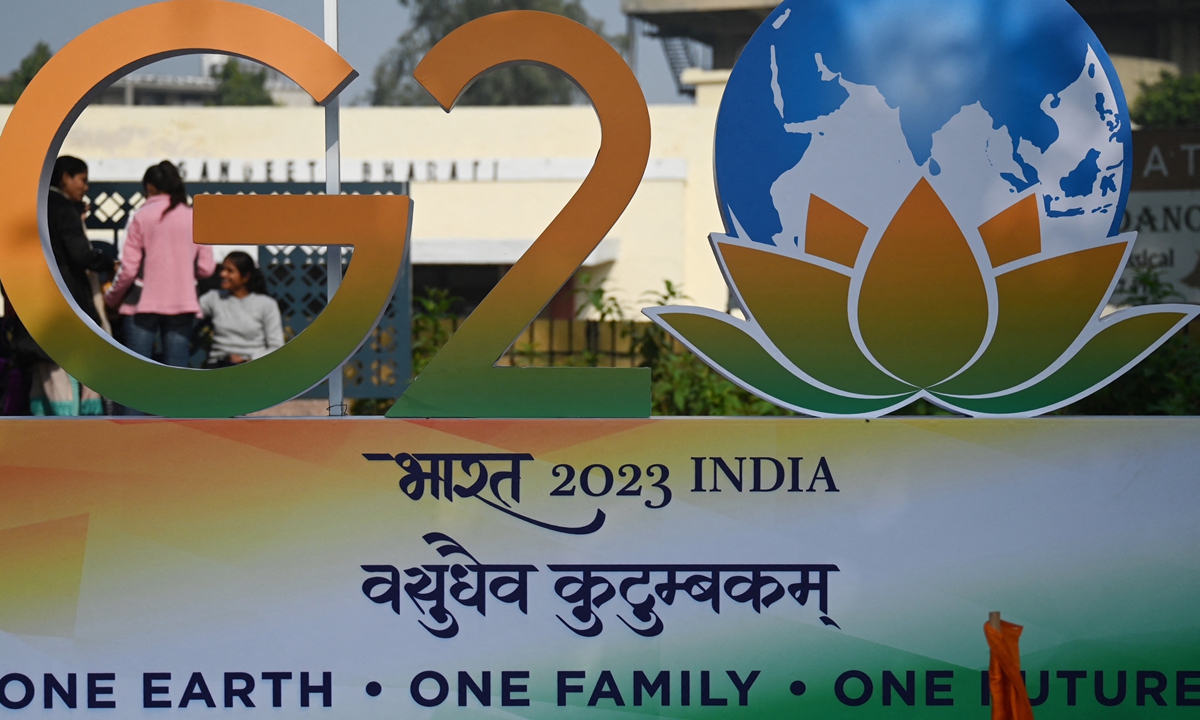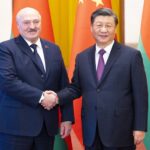
Thousands of people gather during a demonstration at Berlin’s historic Brandenburg Gate, calling for peace negotiations with Russia in the Ukraine war on February 25, 2023 in Germany. Photo: VCG
The escalating wrangling between the West and Russia over the Ukraine crisis may continue to cast a shadow on the upcoming meeting of G20 foreign ministers in New Delhi, India, on the heels of the finance ministers’ meeting in Bengaluru, where a joint communiqué failed to be issued. Analysts said that the US and some Western countries should stop kidnapping the multilateral platform and pressing other countries to join the anti-Russia campaign as this is not conducive to solving the Ukraine crisis and won’t help with addressing pressing global challenges.
The G20 foreign ministers’ meeting will be held in New Delhi on March 1 and 2 with US secretary of State Antony Blinken and Russian Foreign Minister Sergei Lavrov and their counterparts from other G20 states scheduled to participate. Assuming the presidency of the G20 this year, India is reportedly seeking to build a consensus and bridge the gap between the West and Russia ahead of the meeting to arrive at a consensus-driven outcome, Indian media reported.
The news came after the G20 finance ministers on Saturday failed to adopt a joint closing statement at talks in Bengaluru. Russia and China took a position that finance ministers and central bank governors should not get into geopolitical issues while the US, the European Union and the G7 nations insisted they could not back any outcome that did not include a condemnation.
As the US and some Western countries are imposing greater pressure on Russia with more sanctions when the Russia-Ukraine military conflict has been dragged on over the one year-mark, the upcoming G20 foreign ministers’ meeting may face similar struggles in reaching the consensus needed to issue an official end-of meeting communiqué, analysts said.
However, more countries especially developing countries and new emerging economies are becoming more worried and fed up with the US and some Western countries’ attempt to hijack international meetings to air their grievances over the Russia-Ukraine conflict and use various platforms to pressure other countries to join their sweeping economic sanctions against Russia while the world desperately needs a political solution to the conflict as it faces spillover from the crisis and many more other pressing challenges, they noted.
Imperative on developments
As Indian Prime Minister Narendra Modi remarked at the G20 Bali summit last year to make India’s G-20 presidency “inclusive, ambitious, decisive, and action-oriented,” the country has made a packed agenda for the upcoming foreign ministers’ meeting. According to Indian media, events on day two will include two sessions to address multilateralism and the need for reforms, food and energy security and development cooperation and also on counter terrorism and new and emerging threats, global skill mapping and talent pool and humanitarian assistance and disaster relief.
However, with differences over the Ukraine conflict so visible, India will seek a broader approach that focuses on current challenges faced by the Global South, the Economic Times reported.
India, who has maintained good relations with Russia and the West, has more advantages in coordinating the two sides with some of their disputes. But the tussle between Russia and the West over the conflict in Ukraine is intensifying with no one willing to make a compromise, which makes it more challenging to reach a consensus at the foreign ministers’ meeting, Qian Feng, director of the research department at the National Strategy Institute at Tsinghua University, told the Global Times on Monday.
Qian said that the US and some Western countries may continue to beleaguer Russia and blame it for global economic problems and political messes at the upcoming meeting while Russia will strike back. Such tangled battle will shatter the hope of more countries, especially India to boost joint efforts in focusing more global imperatives, especially on economy and developments.
The Russia-Ukraine conflict has a spillover effect on the whole world in many fields and peace talk may help alleviate many problems, including on energy and food crisis. But pressing other countries to denounce Russia is not the right way for a truce, analysts said.
China on Friday unveiled a 12-point position document on the political settlement of the Ukraine crisis, calling on respecting the sovereignty of all countries and resuming peace talks, abandoning the Cold War mentality, ceasing hostilities, and protecting civilians and prisoners of war.
Qian noted that China’s calling for peaceful settlement of the Ukraine crisis reflects the aspiration of many developing countries and new emerging economies for peaceful settlement of the crisis but has been dismissed and smeared by the US, which shows which country hijacks the whole world for its own interests.
With the majority of the international community concerned with more pressing issues on food, energy, security and economic crises and eager to find solutions, the US and some Western countries have been willfully pushing their agenda with their own strategic calculation, which not only exposes their selfishness and hegemony mind-set but also destroys the fundamentals of the G20 mechanism and other multilateral platforms, said analysts, noting that the original intention of the G20 is to solve crises instead of turning it into a stage for displaying a Cold War mentality.
The G20 should prioritize dealing with economic upheaval and the stabilization of global economic development as global supply and industrial chains in energy and semiconductors and other domains have been greatly impacted with fragmentation of policies in the US and the EU, Huo Jianguo, vice president of the China Institute for World Trade Organization Studies, told the Global Times.
It would be hard to lift a world that falls into recession and amid intensifying confrontations between the US, the West and Russia and fiercer China-US competition, the G20 mechanism should play a bigger role in coordinating and driving global economic development, said Huo.
However, what the US and some Western countries are doing, including attacking China and tying up the Russia-Ukraine conflict with economic issues, will further sabotage the global economic development, said analysts.
Clinging to the Cold War mentality and ideology, the small cliques drawn by the US will lead the globalization astray, create more confrontations, further destroying the global industrial and supply chain and trapping the global economic development, said Huo.
The expert noted that possibility cannot be ruled out that some political elites in the US and European countries may attempt to use the Ukraine crisis to restrain developments of new emerging economies, which is very risky as no country can detach itself if the whole world is in deep water.













